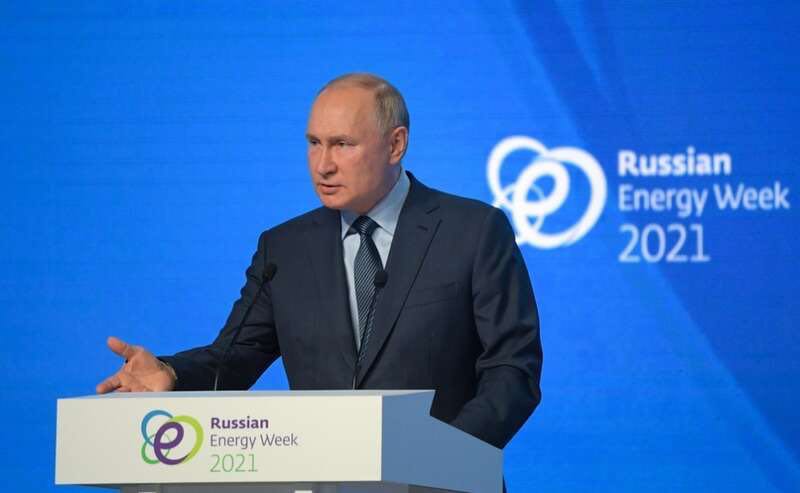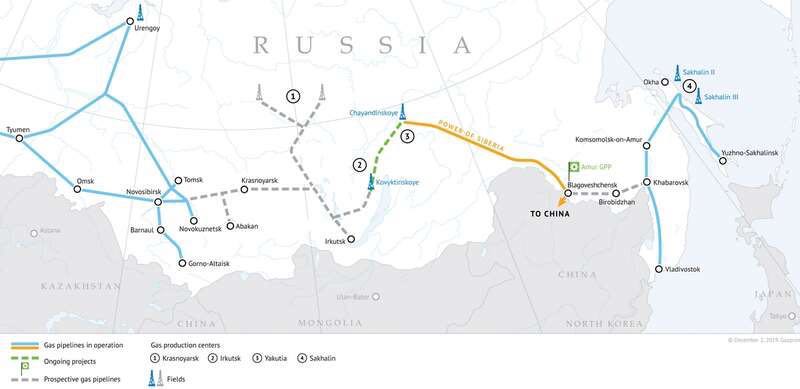The current energy crisis illustrates that the EU’s road to energy transition will be bumpy and reliance on Russian gas is here to stay for longer. At the Russian Energy Week president Putin rebuffed allegations that Russia uses energy as a weapon. His key message to the Europeans was: Russia is your reliable trouble-shooter, if you ask nicely. Further supplies are possible, but on Russia’s terms - by signing long-term gas contracts with Gazprom, says expert on energy politics Maria Shagina.
 President Putin rebuffed allegations that Russia uses energy as a weapon. Foto Kremlin.ru
President Putin rebuffed allegations that Russia uses energy as a weapon. Foto Kremlin.ru
The significantly increased demand for natural gas and the concurrent shortages of its supply drove European gas prices to record highs. The gas prices in October were 400% more expensive than in April 2021. Riding on high gas prices, electricity prices increased over 200% over the same period. A tight global LNG market has exacerbated the situation. Amidst the soaring gas prices, Europe’s vulnerability to rely on external suppliers became particularly pronounced. Moscow has emerged as the sole country which could ramp up supplies and lessen the market pressure.
Traditionally Russia opted for a market share strategy, preferring to supply gas for a cheaper price but to occupy a 35%-40% share on the European markets. This time proved to be different. While Russia is fulfilling its contractual obligations in full, Moscow shunned from sending additional gas supplies via the spot market or Ukraine. The International Energy Agency claimed that Russia could easily increase gas exports to Europe by 15% that would underscore its status as a reliable supplier. European officials accused Moscow of purposefully withholding extra capacity to exert pressure on German authorities to speed up the certification of the controversial Nord Stream 2 pipeline which will bypass Ukraine.
Russia’s image as a trouble-shooter
On Wednesday, during the Russian Energy Week, Russian president Vladimir Putin firmly rebuffed all those allegations. He denied any accusations of Russia using energy as a weapon and described them as ‘politically-motivated blather’. He claimed that Russia has in fact increased its gas supplies to Europe by 15% this year – something that market analysts and traders have not seen a sign of. Putin blamed the Europeans for failing to stockpile enough gas ahead of winter and for their decisions to switch from oil-indexed gas pricing to spot trades and to rely on volatile wind and solar power generation. 'The European energy system is filled with vulnerabilities and this caused the crisis on the market.'
Pointing at the flaws of the EU’s energy market, Moscow’s feeling of Schadenfreude was noticeable. The soaring gas prices have turned the tables: while the EU has been seeking to reduce its reliance on Russia and its gas due to decarbonization, the current energy crunch leaves Moscow as the only country that could quickly alleviate the pressure.
The key message Putin tried to send to the Europeans: Russia is your reliable trouble-shooter, if you ask nicely. Further supplies are possible, but on Russia’s terms - by signing long-term gas contracts with Gazprom. Unsurprisingly, Putin recalled Moscow’s traditional role as a reliable supplier since Soviet times. While Gazprom does not violate any contractual obligations, there is no rush to divert more gas to Europe.
Russian Deputy Prime Minister Alexander Novak confirmed that Gazprom will prioritize domestic market. The company vehemently denies any accusation of geopolitical muscle-flexing: any extra gas available is need to replenish the country’s own gas storages ahead of winter season. Whether it is true or not, this lends Gazprom plausible deniability.
Europe’s toolbox of measures
The current energy crisis illustrated that the EU’s road to energy transition will be bumpy and reliance on Russian gas is here to stay for longer. To address the immediate impact of gas price increases, on Wednesday the European Commission presented its plan to strengthen Europe’s energy market vis-à-vis future shocks. A toolbox of short- and medium-term measures was developed which included emergency income support to households, state aid for companies and tax reduction. The European Commission confirmed its commitment to support more investments in renewables and energy efficiency as well as developing energy storage capacity.
Debates revolved around a suggestion to purchase gas jointly and how to decouple gas prices from electricity prices. The European Commission has also started an investigation of possible energy-price manipulations by suppliers which drove a sharp spike in energy prices. On October 26, EU energy ministers will hold an extraordinary meeting to further discuss the measures.
China as a highly reliable partner
Against Russia’s sour relations with the West, China stood out as a 'highly reliable partner'. Throughout Putin’s speech, the juxtaposition of Europe and Asia was evident: while Europe is now reaping what it sowed by rushing to abandon gas, China was praised for its 'balanced' approach to decarbonization.
Chinese participation and investments in the Arctic projects were purposefully highlighted against the background of Western companies who abandoned Russian energy projects either due to sanctions risks or environmental considerations. As China has become Russia’s major consumer of natural gas, Beijing was portrayed as an insurance guarantee against Europe’s uncertain future gas demand.
 -Gas pipelines from Russia to China. Map Garzprom.ru
-Gas pipelines from Russia to China. Map Garzprom.ru
Indeed, Beijing’s strategy towards energy transition by prioritizing gas fits well with Russia’s own plans for carbon neutrality. While Moscow is ready to decrease the share of oil and coal in its energy mix, natural gas will play a major role in the interim.
Decarbonization threats
While Moscow is currently enjoying its leverage over the European energy market, its place in the sun might not last for much longer. A global push towards renewable energy threatens to undermine Russia’s position as the world’s top energy exporter. By 2050, the European energy market is set to be fundamentally changed, with 'no more space for coal, very little room for oil and only a marginal role for fossil gas'. For Russia, it means major revenue losses. In 2021, revenues from the export of hydrocarbons comprised about 40% of the country’s budget.
Russia has slowly woken up to the threats of climate change and the EU’s plans for decarbonization got the Kremlin’s attention. Rosneft’s CEO Igor Sechin warned the Kremlin that the European carbon border adjustment mechanism (CBAM) could inflict 'incomparably greater damage' than Western sanctions. It is estimated that CBAM could affect Russian goods worth $7.6 billion. In this situation, Russia’s strategy is to sell as much fossil fuels as possible until they are phased out. Understandably, Russia seeks to obtain long-term guarantees from Europe that Russian gas will be in high demand in the next decade.
The Russian government announced that it is preparing a new environmental strategy with stronger measures to reduce greenhouse gas emissions which would enable Russia to achieve carbon neutrality by no later than 2060. At the same time, natural gas, hydrogen and ammonia are set to play a larger role in the country’s energy mix.
During his speech, Putin called for a ‘constructive cooperation to tackle climate change issues’. For Moscow, it means luring European investments and technology and ensuring that Western sanctions do not hinder such a cooperation. The greening of EU-Russian relations might prove to be a stabilizing factor, but it will not be an easy feat against the eroding trust between the two.
Dr Maria Shagina is a postdoctoral fellow at the Center for Eastern European Studies (CEES) at the University of Zurich.
